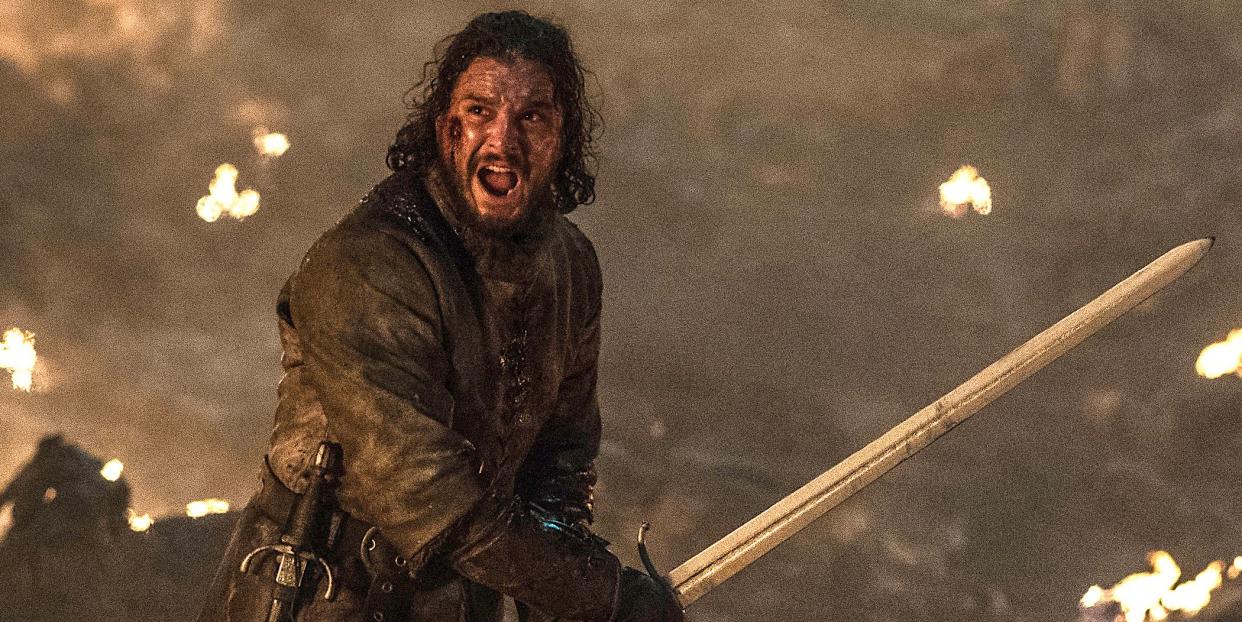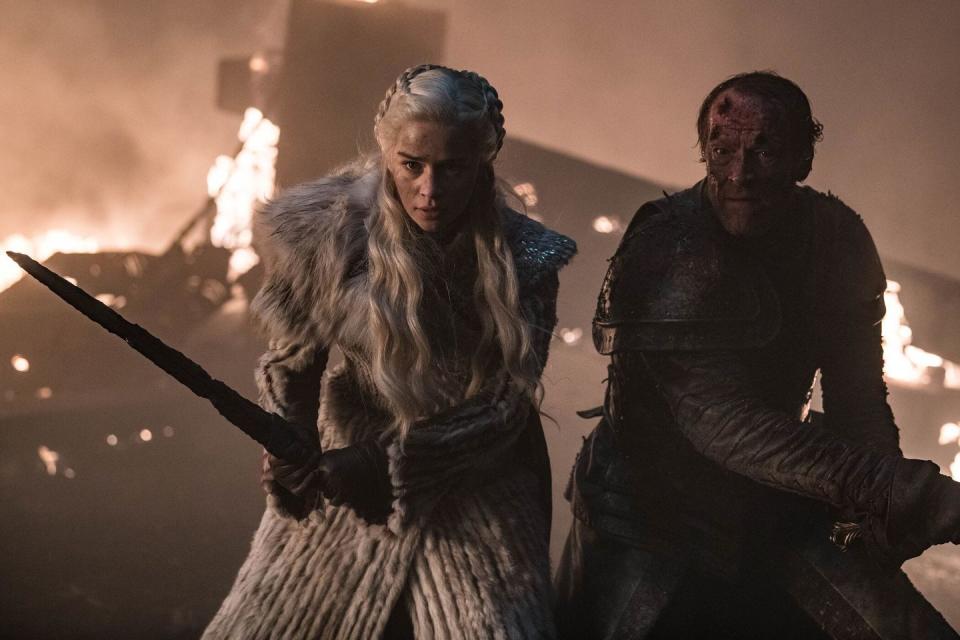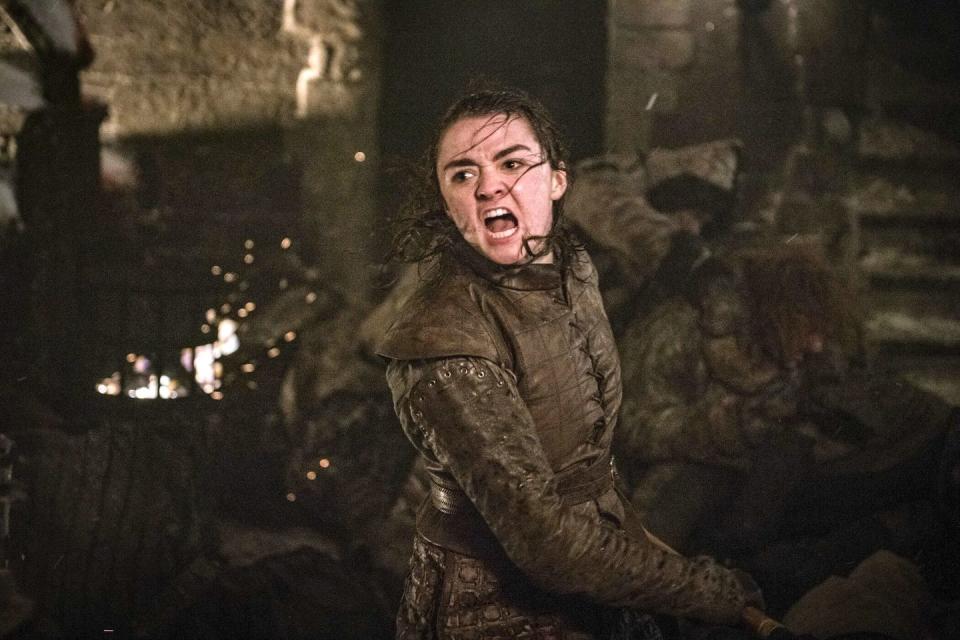Game of Thrones' Battle of Winterfell Was the Television Event of Our Lifetime. But it Wasn't Perfect.

Let's have a moment of silence for everyone who died last night during Game of Thrones' Battle of Winterfell. Let's have another moment of silence for our eyes, squinting to make sense of what the hell was going on in this very dark 83 minutes of television. Let's have a moment of relief for the (surprisingly) many characters who made it through the Long Night. And, finally, let's give it up for Game of Thrones showrunners David Benioff and D.B. Weiss and Episode Three director Miguel Sapochnik for pulling off a truly monumental TV moment. It's unlikely we'll see anything else of this scale for a long time. But, that doesn't mean it was perfect. Let's dig into the blood, fire, ice, and darkness of the Battle of Winterfell.
It seems like we've been hearing about last night's episodes for months now. For a notoriously secretive show, cast and creators of Game of Thrones were unusually talkative about the incredible lengths they went through to film the Battle of Winterfell. And all of it helped build the hype for the climactic battle that Game of Thrones has been working toward for a decade: The battle between the living and the Night King's army of the undead. And what a battle it was: 83 minutes of non-stop action, beautifully shot and choreographed, with the tension brilliantly paced throughout. It opens with a silent tracking shot beginning with Samwell Tarly's shaking hands as he decides to fight for the living and continues to linger on each character as they prepare for battle. From there, the episode generously weaves dozens of narratives throughout the fray, occasionally taking time for quiet, sweet moments like one shared between Tyrion and Sansa, or a close-up of Samwell's face as it seems like all is lost for the humans.
"That was a really tough moment to film. We had been filming for a long time and we felt like it had really been starting to take its toll on us. We felt battle scarred," Samwell Tarly actor John Bradley told me of that scene. "I was leaning against bodies of people who presumably Sam had known. They were just stuffed dummies, but it was really an eerie moment, because you're looking at dead human faces and hands, and it can have a visceral effect on you. It felt when I was filming that moment that it might be the most memorable moment in my entire time on this show."
And it made for a quiet, personal scene in one of the biggest episodes of television ever filmed.
That is the genius of the Battle of Winterfell, a fight sequence the likes of which we've never seen which also takes the time to focus on these small character interactions. Who could forget the heartbreaking death of Lyanna Mormont or the beautiful and tragic conclusion to Jorah Mormont's devotion to Daenerys Targaryen?
But here's the thing I hate to say about the Battle of Winterfell: In some ways, the showrunners played it safe. Jorah died, Theon died, and so many others we've known from the beginning. But there was no major "what the fuck" moment. Brienne and Jaime are still standing. So are Jon and Daenerys. Arya and Sansa are fine. George R.R. Martin wrote, "There are no happy endings," but the Battle of Winterfell certainly seemed to have one. People had death brackets prepared which listed every person they thought would go. Most considered anyone but the most important players to be goners after the Battle of Winterfell. And, like the deaths of Robb and Ned Stark, it seemed appropriate for Game of Thrones to kill Jon or Dany halfway through the final season. Yet, compared to expectations-and what we've seen on this show with the Red Wedding and Sept of Baelor-the Battle of Winterfell played it comparatively safe.

So, let's talk about how this all went down. Their plan was pretty bad to begin with: Use Bait Boi Bran "The Three-Eyed Raven" Stark to lure the Night King into the Godswood so someone can kill him. Meanwhile, it's unclear what Jon and Dany were supposed to be doing this whole time. I think we can all agree that Jon and Dany really fucking boned this whole battle. While thousands were fighting and dying, Jon and Dany were kind of tumbling around in a storm? Jon fell off his dragon after doing nothing with it. Dany failed to kill the Night King with Drogon, then kind of just stood around gawking as wights pummeled her dragon. Then as she was on the ground unprotected, Jorah stepped in to give his life to save hers.
Yet, the living still ended up winning because Arya Stark was the only Stark worth a damn on the battlefield.

Remember the crypts? Those very safe crypts? Have you heard of them? Yes, as everyone expected, those crypts were probably the worst place to be. Because when you're fighting a villain who can reanimate the dead, hiding in the place where you keep your dead is probably a bad idea. Who would have guessed!?
Anyway, Arya fought off the dead in the crypts and warned everyone of what was to come. Then, as the Night King was about to kill Bran Stark, she (somehow) appeared out of nowhere and killed him using her extremely Michael Jordan dagger hand switch.
I'm glad Arya was the one to kill the Night King, but narratively speaking, how this all played out didn't exactly work for me. I maintain that Martin wrote this entire saga for it to end with Jaime Lannister killing the Night King. While it's not as cool as Arya being the hero, it does make a lot more sense given the clues set up throughout the books and shows. Jaime is the Kingslayer, after all.
But, with the Night King dead, what are we left with?
They still have the whole Cersei situation to deal with, but there's something about this conclusion to the Night King arc that feels so unsatisfying. We still don't know what the Night King wanted other than to Kill All Humans. Is that all we get? Will there be a deeper explanation to come? He was just there, never saying a word, walking toward Winterfell until now suddenly he isn't. Wouldn't a motive have made his character so much more compelling? Given the Night King didn't have any sort of interesting depth, I'm happy to see the story turn to Cersei, who is a truly complex villain.
So, inevitably the show will now turn its sights toward the South, where the whole Iron Throne still needs to be dealt with. And that will be a tough situation, given the northern army has been decimated and Cersei now has a shiny new Golden Company army at her disposal.
('You Might Also Like',)

